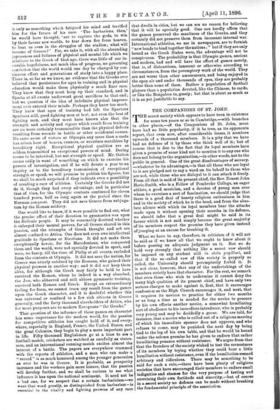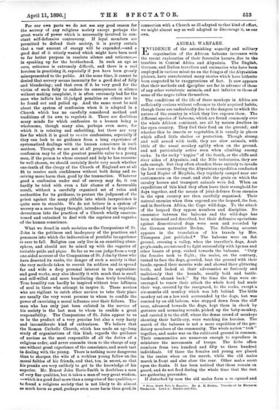THE COMPANIONS OF ST. JOHN.
THE secret society which appears to have been in existence for some ten years or so in Cambridge,—with branches in other places,—of the Companions of St. John, must have had no little popularity, if it be true, as its opponents report, that even now, after considerable losses, it numbers upwards of a thousand members. It is a pity that we have had no defence of it by those who think well of it; but of course that is due to the fact that its loyal members have given a promise of some kind not to mention it to any one who does not belong to the organisation,—in other words, not to the public in general. One of the great disadvantages of secrecy, —whatever be its advantages,—is that all those who are loyal to it are pledged not to say a word on its behalf to those who are not, while those who are disloyal to it can attack it freely. From all that is said of its present chief, the Rev. Ernest John Heriz-Smitb, who is a Fellow of Pembroke College, an eager athlete, a good musician, and a devotee of young men over whom be exercises a sort of fascination, we should judge that there is a good deal of hearty religious enthusiasm in him and in the society of which he is the head, and from the abso- lute silence with which its loyal members bear the attacks made upon it without opening their months in its defence, we should infer that a great deal might be said in its favour which is not said simply because the great majority of its members respect the promise they have given instead of jumping at an excuse for breaking it.
What we have to say, therefore, in criticism of it will not be said as if we knew all that we ought to know about it before passing an adequate judgment on it. But we do hold very strongly that nothing like a secret vow should be imposed on any student still in statu papillori, and that if the so -called vow of this society is properly so called, the University should peremptorily forbid it. It is not clear, however, that any of the undertakings of the members strictly have that character. For the rest, we remark that even those who wish to undermine it cannot deny the many high qualities of its present chief, and have only two serious charges to make against it, first, that it encourages confession as the High Church encourages it, and next, that it requires its novices to practice for either two months or as long a time as is needed for the novice to procure by his own efforts another novice, a somewhat humiliating sort of obedience to his immediate introducer, who is probably very young and may be decidedly a goose. We are told, for instance, that a novice who is called out of a religious meeting of which his immediate sponsor does not approve, and who refuses to come, may be punished the next day by being tied to the leg of his own table, and that he would be bound under the solemn promise he has given to endure that rather humiliating penance without resistance. We argue from that that the founders of the society wished to test the earnestness of its members by trying whether they could bear a little humiliation without resistance, even if the humiliation seemed arbitrary and ridiculous. There may be something to be said for such a rule,—there have been plenty of religious societies that have encouraged their members to endure small indignities and shames for the very purpose of testing and exercising their own fortitude and sincerity,—but of course in a secret society no defence can be made without breaking the fundamental principle of the association. For our own parts we do not see any good reason for the secrecy of any religious society except perhaps the great waste of power which is necessarily involved in con- stant self-defensive controversy. If loyal members are permitted to defend their society, it is pretty certain that a. vast amount of energy will be expended,—and a good deal of it utterly wasted which might have been used to far better purpose in resolute silence and reticence,— in speaking up for the brotherhood. In such an age as ours, reticence is extremely difficult, and there is a real heroism in practising it, especially if you have been grossly misrepresented to the public. At the same time, it cannot be denied that secrecy means immunity for a good deal of folly and blundering ; and that even if it be very good for the victim of such folly to endure its consequences in silence without making complaint, it is often extremely bad for the man who inflicts his ill-judged penalties on others not to be found out and pulled up. And the same must be said about the system of confession when it is adopted in a Church which has no carefully considered method and traditions of its own to regulate it. There are doubtless many minds for which confession to a human being is 'w.'nolesome, though many also, perhaps even more, for which it is relaxing and enfeebling, but there are very few for which it is good to receive confessions, especially if they can look to no guidance from a long experience of
systematised dealings with the human conscience in such matters. Though we are not at all prepared to deny that oonfession may be of the greatest possible value to a young man, if the person to whose counsel and help he has recourse he well chosen, we should certainly doubt very much whether one-tenth of the clergy of the Church of England are at all fit to receive such confidences without both doing and re- oeiving more harm than good by the transaction. Whatever good a confession under seal of secrecy may do, it can hardly be tried with even a fair chance of a favourable result, without a carefully organised set of rules and authorities for its guidance, to protect the judgment of the priest against the many pitfalls into which inexperience is -quite sure to stumble. We do not believe in a system of secrecy as a mere happy thought, introduced by an impulsive devoutness into the practices of a Church wholly unaccus- tomed and untrained to deal with the caprices and vagaries of the human conscience.
What we dread in such societies as the Companions of St. John is the pettiness and inadequacy of the practices and penances into which the indiscretion of youthful inexperience is sure to fall. Religion can only live in an ennobling atmo- sphere, and should not be mixed up with the vagaries of irritable pride and pique. So far as we can judge from a very one-sided account of the Companions of St. John by those who have deserted its ranks, the danger of such a society is that the very methods taken to recruit its soldiers and to spread far and wide a deep personal interest in its aspirations and good works, may also identify it with much that is small and self-willed and more humiliating than truly humbling. True humility can hardly be inspired without true loftiness of soul in those who attempt to inspire it. These novices who are vigilant to catch other novices to take their place are usually the very worst persons to whom to confide the power of exercising a moral influence over their fellows. The man who has only just been enlisted in the service of his society is the last man to whom to confide a great responsibility. The Companions of St. John appear to us te be the product of a very genuine but also a very hasty and inconsiderate kind of enthusiasm. We believe that the Roman Catholic Church, which has made an age-long study of organisations of this kind, regards the guidance of novices as the most responsible of all the duties of a religions order, and never commits them to the charge of any one without great experience of the conscience, and much tact in dealing with the young. There is nothing more dangerous than to sharpen the wits of a reckless young fellow on the moral foibles of his friends, and that, too, in secret, so that his pranks are very unlikely to get to the knowledge of his superior. Mr. Ernest John Heriz-Smith is doubtless a man of very fine qualities, but it takes a man of very great wisdom, —which is a good deal more than a congeries of fine qualities,— to found a religious society that is not likely to do almost as much harm as good, perhaps even more harm than good, in connection with a Church so ill-adapted to that kind of effort, we might almost say so well adapted to discourage it, as our own.



































 Previous page
Previous page